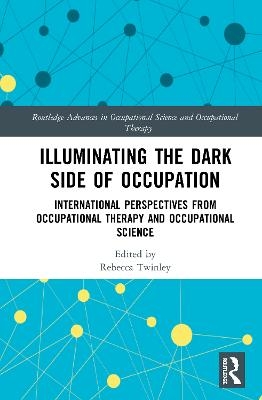
Illuminating The Dark Side of Occupation
Routledge (Verlag)
978-0-367-21814-0 (ISBN)
Emphasising that people’s individual experiences of occupations are not always addressed and may not always be legal, socially acceptable, or conducive to good health, the book investigates how these experiences can be explored theoretically, in practice and research, and in curriculum content for those learning about occupation. Beginning with a discussion of some assumptions and misunderstandings that have been made about the concept, the substantive chapters present and analyse tangible examples of the concept’s applicability. This ground-breaking and practice-changing text provides ideas for future research and highlights contemporary, internationally relevant issues and concerns, such as the coronavirus pandemic.
This book is an essential purchase for students in occupational therapy and science, and valuable supplementary reading for practitioners. It is also relevant to a wide interdisciplinary audience with an interest in human occupation, encompassing anthropologists, councillors, criminologists, nurses, and human geographers.
Rebecca Twinley (known to many as ‘Bex’) recently took up the post of Senior Lecturer on the Occupational Therapy Programme at the University of Brighton. Bex is creator of the concept ‘The Dark Side of Occupation’, which has been attracting increasing global attention. Bex has been an approved member of the Occupational Therapy Europe Register of Experts in the area of dark side of occupation since May 2019. Her doctoral work focused on the lack of acknowledgement regarding a form of sexual offending that had been ignored: woman-to-woman rape and sexual assault. She enjoys thinking critically, challenging norms and assumptions, or just the plain and obvious lack of address of issues that impact upon people and their subjective experiences of occupations. Bex lives in East Sussex, UK and works at the University of Brighton, which she calls her "occupational home".
1.The Dark Side of Occupation: An introduction to the Naming, Creation, Intent, and Development of the Concept Section I Theorising the Dark Side of Occupation 2.The Dark Side of Occupation: Accumulating Insights from Occupational Science 3.The Dark Side of Occupation: An Historical Review of Occupational Therapy 4.The Whole of the Moon: How Our Occupational Lens Helps or Hinders Our Exploration of the Dark Side of Occupation 5.Ontological and Epistemological Considerations in Understanding Occupations in Extreme and/or Oppressive Contexts: "Doing Non Violent Resistance" in Palestine Section II Researching the Dark Side of Occupation 6.Homelessness and Occupation 7.Occupational Transition from Smoker to Non-Smoker: The Perceived Consequences in Women’s Lives 8.Self-Defeating Behaviour in an Individual with Borderline Personality Disorder from An Occupational Perspective 9.Exploring the Impact of Childhood Sexual Abuse Trauma in the Context of the Occupation of Work Section III Occupational Therapy Practice 10.Challenges for Occupational Therapists Working with Clients who Choose Illicit, Immoral or Health-Compromising Occupations 11.Substance Use and Recovery as Part of Daily Life: A Zimbabwean Perspective of Substance Use as an Occupation among Young Adults Living with HIV 12.The Dark Side of Occupation in an Eating Disorder Intensive Day Service 13.Occupational Engagement in Forensic Settings: Exploring the Occupational Experiences of Men Living within a Forensic Mental Health Unit 14.The Development of an Assessment which Provides a Practical Application of the Concept of the Dark Side of Occupation for Practitioners and Students Section IV Occupational Therapy Education 15.Occupational Therapy Sounds Too Nice: Reflections from a Recently Trained Occupational Therapist 16.The Dark Side of Studying at University 17.How the Dark Side of Occupation can be Instructed in a Course: Learning from Occupational Therapy 18.Not Everything is Rosy and Not Everyone Wants to Fix their Garden: An Australian Example of Integrating the Dark Side of Occupation into Curriculum for Final Year Students 19.The Value of Exploring the Dark Side of Occupation in Pre-Registration Occupational Therapy Education, Using Homelessness as a Case Study 20.The Dark Side of Occupation: A Conversation of our Evolution and our Future
| Erscheinungsdatum | 19.10.2020 |
|---|---|
| Reihe/Serie | Routledge Key Themes in Health and Society |
| Zusatzinfo | 8 Tables, black and white; 7 Line drawings, black and white; 20 Halftones, black and white; 27 Illustrations, black and white |
| Verlagsort | London |
| Sprache | englisch |
| Maße | 156 x 234 mm |
| Gewicht | 453 g |
| Themenwelt | Sachbuch/Ratgeber ► Gesundheit / Leben / Psychologie |
| Geisteswissenschaften ► Psychologie ► Allgemeine Psychologie | |
| Geisteswissenschaften ► Psychologie ► Sozialpsychologie | |
| Medizin / Pharmazie ► Medizinische Fachgebiete ► Arbeits- / Sozial- / Umweltmedizin | |
| Medizin / Pharmazie ► Physiotherapie / Ergotherapie ► Ergotherapie | |
| Medizin / Pharmazie ► Physiotherapie / Ergotherapie ► Rehabilitation | |
| ISBN-10 | 0-367-21814-3 / 0367218143 |
| ISBN-13 | 978-0-367-21814-0 / 9780367218140 |
| Zustand | Neuware |
| Haben Sie eine Frage zum Produkt? |
aus dem Bereich


